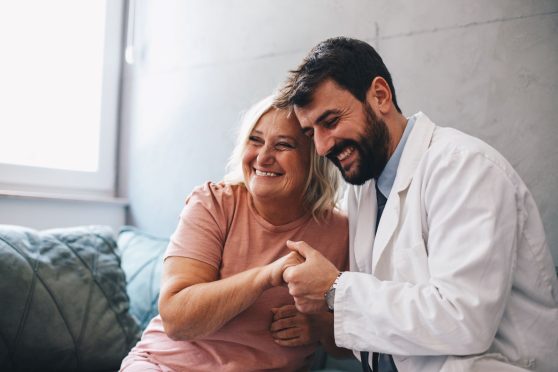When you’re fighting an insistent urge to use alcohol or substances to dull reality, isolation only makes it more difficult. Yet the nationwide call for avoiding interaction with people other than fellow household members during the COVID-19 pandemic has become a cruel irony for people battling addiction
Faced with public health mandates, many treatment facilities nationwide have closed or shifted to predominantly virtual care. That, according to Dr. J. Craig Allen, vice president of addiction services with Hartford HealthCare’s Behavioral Health Network (BHN), compounds people’s fears of infection in healthcare facilities to strain the contact many crave in recovery. It is also at least partially responsible for record-setting opioid deaths during the pandemic, according to the Centers for Disease Control and Prevention (CDC).
“Personal connection is the key in treating substance use disorder (SUD) and more severe psychiatric disorders. Humans evolved in groups and do best with others around. It’s the way we’re built, so when possible we try to maintain that option,” he said.
A study in Drug and Alcohol Review noted that loneliness increases the risk of drug and alcohol abuse in people with SUDs. Pandemic statistics so far offer further proof – several studies show increases in binge drinking and the CDC reported a 98 percent increase in opioid deaths in 10 states, for a 12-month death rate of more than 81,000 people. In Connecticut, state health officials in December projected more than 1,300 overdose deaths in 2020, up from 1,200 in 2019.
Overdose deaths in general also increased during the pandemic, according to the CDC. There were 26.5 percent more deaths involving cocaine and 34.8 percent more deaths involving psychostimulants such as methamphetamine.
Experts with such medical journals as The Lancet and the Journal of the American Medical Society point to the isolation resulting from protective measures during the pandemic as contributing factors to such increases.
At the BHN, Dr. Allen said efforts have been to maintain personal connection whenever possible to support clients seeking recovery.
“Our approach remains the same – focusing on prevention, identifying risk and identifying SUD the earlier the better with the offer of treatment,” he said. “We try to meet with people and work with them as individuals, something COVID has made more difficult.”
Although BHN inpatient services never closed, he said, several outpatient programs emphasize strategies to help maintain connections for people seeking help.
Those include:
- TryCycle. This smartphone application is accessible to people who have gone through treatment at Rushford, the BHN’s addiction services facility where Dr. Allen is medical director. The application asks the patient to complete a simple “check in” and to journal.
- Recovery Support Specialists (RSSs). People who have lived experience undergo extensive training to serve as resources for people coming into Hartford HealthCare programs suffering from psychiatric and/or SUDs. RSSs work with the treatment team to enhance and support patients working toward recovery. A specialized program using Recovery Coaches (RCs) is available in the system’s emergency departments. RCs can make unique connections that often translate into referrals for treatment or outpatient recovery services.
- Community programming like Meriden Opioid Referral for Recovery (MORR). Case managers, clinicians and RSSs provide outreach to the community when first responders identify people who have had life-threatening problems with opioids but are not involved in traditional treatment programming.
“Engagement improves when we text, call and Zoom with clients. We even use emojis,” Dr. Allen said, referring to the practice of checking in with patients by sending a “thumbs up” or other characters to reinforce actions and behaviors consistent with the treatment plan and recovery. “The feedback and data show that people are using TryCycle. And the people who struggle more use it more.”
The concept, he explained, is simple human nature.
“It reinforces the fact that people care and are thinking about you. And feeling more connected helps people stay sober,” Dr. Allen said.


